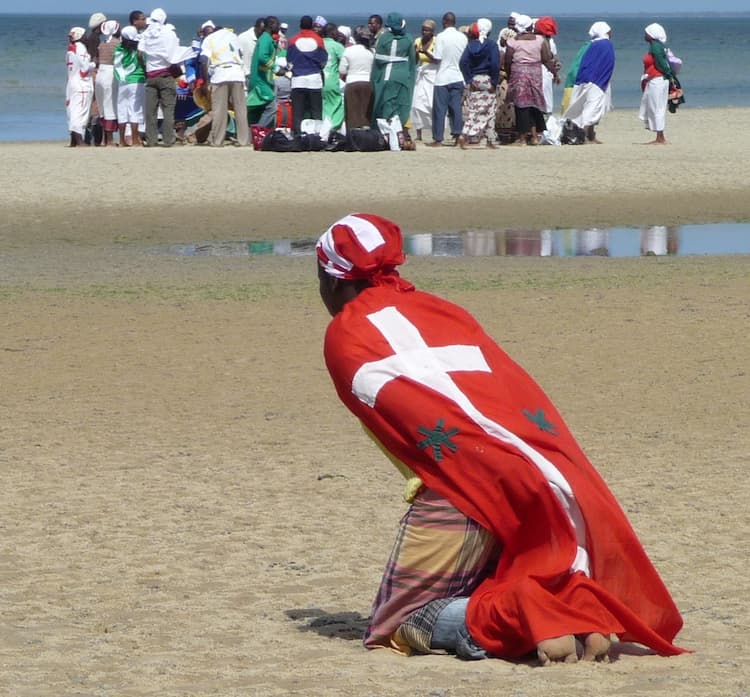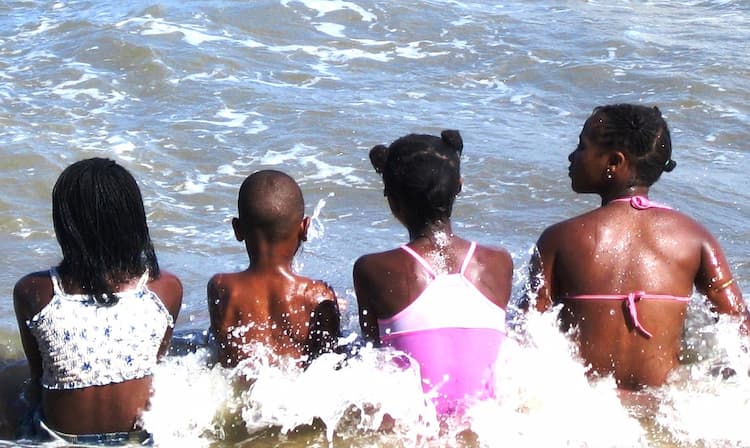
Go World Travel is reader-supported and may earn a commission from purchases made through links in this piece.
Mozambique is wearing, once again, a timid smile. It has been through a torrid time: 450 years of colonisation, a war against the Portuguese, independence in 1975 and then the cruelest of wars – a savage 16-year civil war which left almost a million dead, five million displaced, families and the country divided.
Two thirds of rural bridges, roads, railways, health centres and primary schools were destroyed during the war – a proxy war waged between Russia and the West. Since 1992 peace and economic growth – though extremely unequal – has helped Mozambique back off its knees.
Best Tips & Tools to Plan Your Trip
It seems to me a type of natural justice that the pleasure of being alive is often strongest amongst those who struggle the hardest. This pleasure is amongst the most vivid impressions I have of Mozambique and Africa in general.
Mozambicans, like most Africans, love to party and the simplest occasions are seized upon as an excuse. In a collective culture there are always others willing and able to get into party mood. Of course parties cost money, a commodity still in noticeably short supply in Mozambique, so many people head to where it is cheapest to make merry: the beach.

The warm water of the Indian Ocean laps the 2,500 miles of Mozambican coast from Tanzania to South Africa and there are hundreds of beautiful, often deserted, beaches. Most of big towns have beaches nearby and people head to the sands when the mercury rises.
Maputo beach on the outskirts of the capital city is one of them. Many, without money for the local minibus, walk long distances to get there. They don’t go to swim, few can, or to suntan, few need to, but to play and socialize.
They jump up and down in the water and do cartwheels at the edges. Groups of young boys and girls play football as they howl and scream. Anyone can join in. They shout, “Come and play”. There are children scooping the sand for the tiny crabs, frolicking in the warm water, rolling about in the shallow water in dips in the sand at low tide.
Groups of teenagers, girls and boys, dance in ankle deep surf to the sound of their own singing or to the blare coming from a loudspeaker in an open car trunk. Some come simply to do business: women and their children grill fish or chicken to serve with “Xima” which is a dish made from milled maize.

The small fish, called ‘magumba’, is fished in the bay and is both tasty and very bony. Cooked over charcoal and with a dollop of ‘Xima’ – corn porridge – you have your fill- eating with your fingers- for about a dollar.
There are sellers of oranges, drinks, and various kinds of nuts. Some young men carry around the full panoply of nail varnishes and paint toenails and fingernails often with unusual and creative designs. There is a photographer or two strolling.
Some young men tote around a trampoline which kids jump on for a few cents. A young man is jerking the strings of two wooden, gaudily coloured puppets as he has them shudder and jump in some obscene dance.
Its role also is as a huge “singles” meeting place. Few young people have the chance to go to bars or discos, places where they might meet the opposite sex, so the beach serves this purpose. They come to see and be seen, admire and maybe acquire.
Some serious flirting is done by both sexes as girls stroll with their mobile phones in their hands. Evangelical churches use the beaches for baptisms, prayer meetings and exorcisms. These are colorful occasions and especially noisy when a devil is being exorcised – with much pummeling, rolling in sand and energetic immersion in water.
The beach is the most democratic “institution” in Mozambique – nobody is refused permission. Dress code is informal: street clothes, swimwear, underclothes, collar and tie, religious robes… Girls squat down to urinate wherever there is a dip in the sand – there are no toilet facilities. After nightfall, strolling on the sand, you watch out for robbers and amorous couples.

Of course, it’s not all fun and games. Further on, at the end of the beach there is the fishing village, there, it’s the business end of things. There, each day, weather permitting, people, mainly women, wait for the fishermen in their small, artisanal fishing boats to come back with their catches and ‘magumba’, the small bony but very plentiful local fish, found in the bay, is landed.
Not exactly landed, as the women wade out at low tide to meet the boats, there being no pier. Business is brisk. Some buy to bring home; some buy to sell in the local market.
I sometimes take a book and sit under a coconut tree. I am seldom left alone. It surprises people to see someone reading on the beach, or anywhere else for that matter. There is little reading culture in Mozambique: books are prohibitively expensive, and few schools have them.
Somebody will usually come to ask what I’m doing or maybe show off their rudimentary English. A girl may try to flutter her plastic lashes to see if I am concentrating on my book. Would she like to drink something? Of course she would. Would she like a lift back to town? Of course she would.
Business, pleasure, exorcisms, worshipping the sea, finding a partner, chilling out, getting drunk, dancing, fighting, showing off: there are many opportunities and few dull moments on Maputo beach.
Inspire your next adventure with our articles below:
Author Bio: Donal Conlon was born in the West of Ireland on the banks of the river Shannon. He graduated from University College, Dublin, taught for some years in Dublin, left Ireland to travel and, as fortune would have it, never returned. He has worked in many countries in Europe and also in the USA, Asia and Africa, mainly in education. He taught Economics (in English) in Paris 2 University for 18 years while also running a travel agency which specialized in educational travel. In 2005 he left Paris to work in The National University of Mozambique for twelve years, where he trained teachers of English for their secondary schools.
- Discover Claremont, California Along Historic Route 66 - December 6, 2024
- Three Sites to Soothe the Soul in Kyoto, Japan - December 5, 2024
- 13 Essential Tips For Women Traveling in Morocco - December 4, 2024

